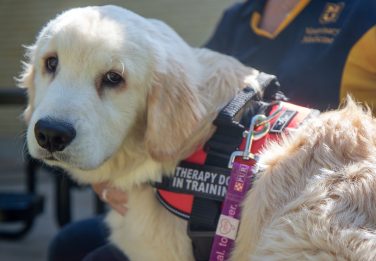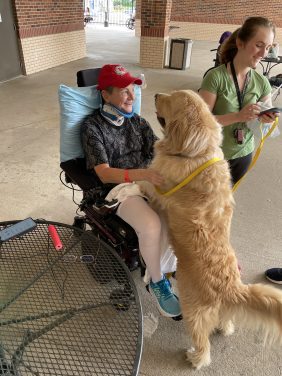Published on
Updated on
Published 6/20/2024

As a veterinary oncologist, MU College of Veterinary Medicine Professor Carolyn Henry, DVM, MS, DACVIM, has witnessed her share of cases where the close bond between clients and their pets affected the wellbeing of both. The connection people have with companion animals was further underscored for her in 2022 when injuries from an accident left her temporarily paralyzed. During her months of recovery, family members would bring her golden retriever to visit her at the center where she was undergoing physical rehabilitation.
“It cheered up not just me, but everyone who was out on the patio at Rusk Rehab,” Henry said. “There was something very therapeutic about those visits.”
Henry’s years-long involvement with the college’s Barkley House further reinforced the mutual healing benefits of the relationship between people and pets. Barkley House was a project intended to offer pet-friendly lodging for families whose pets are receiving treatment at the MU Veterinary Health Center.
Drawing from those experiences, Henry became involved with the Human Animal Bond Research Institute. She received her human-animal bond certification from HABRI in January. That spurred her interest in working with the CVM Research Center for Human-Animal Interaction. Founded in 2005, ReCHAI is a center for community programs, research, and education focused on the health benefits of human-animal interactions.
During her tenure as facilitator for Mizzou’s One Health/One Medicine Mizzou Advantage initiative, Henry worked with ReCHAI’s founder, Rebecca Johnson, PhD, RN, FAAN, on multidisciplinary collaborations across MU. The colleagues were also both National Academies of Practice members. The NAP is an interprofessional group of healthcare practitioners and scholars dedicated to supporting affordable, accessible, coordinated quality healthcare for all through advocacy and interdisciplinary education and research.
Johnson, who was retired from ReCHAI, passed away in May of this year.
“I spoke with Rebecca a lot in the past year, and she mentioned several times how essential it is that ReCHAI be continued.” Henry said.
CVM Interim Dean Leah Cohn, DVM, PhD, DACVIM, appointed Henry director of ReCHAI, effective June 7.

Henry said she will continue working with Gretchen Carlisle, PhD, MEd, RN, CHESS, who has led ReCHAI’s research studies since Johnson’s retirement. Carlisle’s investigations primarily focus on autism and the effects animal interaction have on children with autism. Henry wants to expand the center’s research projects through collaborations with other veterinary schools. She also plans to revitalize community programs like the partnership with the pet-friendly senior residential community TigerPlace. To that end, Henry recruited a new partner to assist her community program efforts — a 5-month-old golden retriever named Kenny. Henry is training Kenny to become a certified therapy dog visiting schools, hospitals, and nursing and veterans homes.
Henry is also partnering with the Red Rover organization and Purina’s Purple Leash Project, both of which she envisions as opportunities to involve veterinary students and expand ReCHAI’s teaching mission. Red Rover assists animals in crisis through emergency sheltering, disaster-relief services, financial assistance, and educational programs. The Purple Leash Project works to keep domestic abuse survivors and their pets together.
“The Purple Leash Project encourages domestic violence shelters to be pet friendly,” Henry said. “Women and sometimes men are frequently reluctant to leave abusive situations because they can’t bring their pets. But if they leave them behind, those pets will be left in danger. Only 19 percent of domestic violence shelters are pet friendly. Our goal is for 25 percent of shelters to be pet friendly by 2025.”